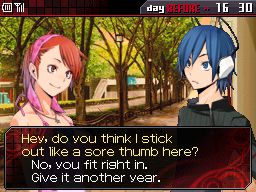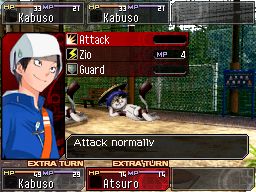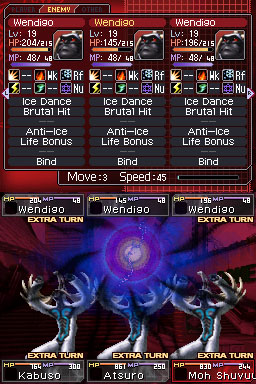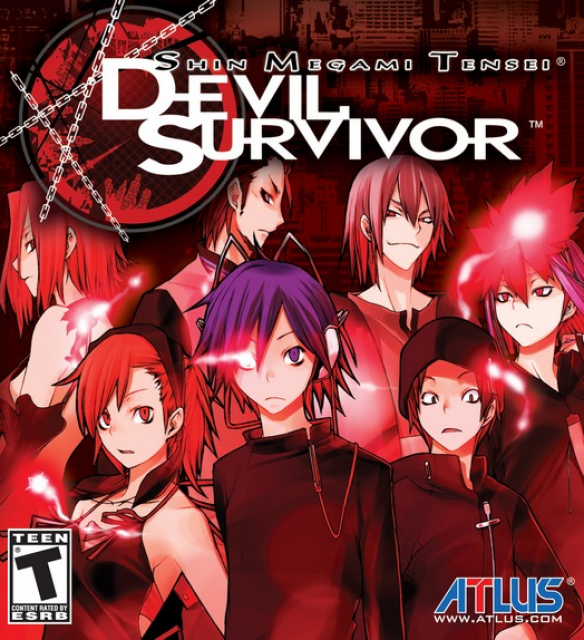Devil Survivor: The Game Able to Topple (This Reviewer's) Doubts
Shin Megami Tensei: Devil Survivor is something which, by all superficial accounts, shouldn't be for me at all. While I've absolutely adored some installments in the venerable RPG franchise, more often than not, I've typically been at least apathetic towards games bearing that series' name, if not outright disliking or loathing them. Throw in the fact that this game is a strategy RPG, a genre I find to be usually too inaccessible to me, and you have a game which I should probably be despising. So it is with that said that I naturally expect you to look at the score I've assigned the game and be confused after that quasi-disclaimer. But I assure you that there is a reason behind this madness and it's a simple one. Devil Survivor takes the best of both Shin Megami Tensei games and strategy RPGs and makes a game out of that combination which even the most ardent skeptics like myself can enjoy greatly, creating an experience whose sheer quality is hard to justly describe, but is one that is certainly worth the $30 admission price.

The context behind this fighting involves a plot which places Tokyo under a lockdown, seemingly to prevent an outbreak of otherworldly demons from leaking out into the rest of Japan and the world at large. While simplistic at first glance, the game's story fleshes out quickly and becomes a tale whose depth is found in surprising places. This is especially true of how referential the game is of Biblical tales when considering its country of origin has never been predominantly Christian. Devil Survivor takes creative licenses with stories such as the Tower of Babel and the strife between Cain and Abel to create a really unique atmosphere. People want answers to the numerous questions they have about the situation and citing the Bible is actually one of several different ways that the plot provides potential answers. In the end, though, it's up to you to come up with your own answers that you believe are right, which results in the game, at times, posing difficult moral choices that determine which ending you ultimately get. The arguments for and against each choice are also made apparent by the game during those times, making sure that you at least understand the potential implications of going one way over another, even if you don't know what the end result will specifically be.

To faciliate a good use of time, you're introduced to the two key functions of the COMP early in the game: the Death Clock and Laplace Mail. The Death Clock, which appears over everybody's head, is an algorithmic prediction of the number of days someone has left to live. The number can change for both better and worse depending on what decisions the characters make that then change the prediction they have and given that the Death Clock has a tendency to be correct if the events aren't changed to work in your favor, it's something that's taken very seriously. This is where the Laplace Mail comes into play. At the beginning of almost every day, you receive an email with headlines about events that will occur that day at specific times. Those times function as deadlines for you to get other things done before you have to address that day's major happenings. What your activities entail up until those points is largely up to you, as the game lets you explore numerous sublots in your free time. (You are, however, free to grind almost whenever in specific areas without losing any time whatsoever.) It's in those subplots that the characters really come to life, too. While the cast is large and really diverse, everybody in the game feels really well-developed. Even if not all of their actions are agreeable 100 percent of the time, you're never left puzzled as to their motivations, since Devil Survivor ensures you get to know the people really, really well.

The other battle-related function the COMP gives you is fusing. If there is one feature of the game outside of fighting which is bound to get the most attention, the fusion system could very well be it, as it makes some significant improvements over past Megami Tensei games. The process of fusion is still largely the same in the beginning, what with picking two demons and being able to check out the final result before you commit, but what really matters is the fact that you can now directly choose which abilities the new demon inherits after the fusing process has concluded. There's no more randomization, folks; what you get in the final product is left up to you, save for a few predetermined abilities that the new demon naturally learns as it levels up. Additionally, there's now a really handy search function that lets you go through your library of demons according to how you set up different variables. While arguably not nearly as "necessary" as being able to control skill inheritance, the search function is still a great tool, especially when its mode is switched to showing the fused demons first and then a list of what demons you can use to make them then appears afterwards.

Beyond those things, the game is perfectly competent on a technical front. The graphic style, while aesthetically pleasing, isn't pushing the DS hardware a lot. The same can be said of the game's sound design. It's fine and nothing is particularly wrong with it. If praise should be latched onto one area of the game when it comes to what's running underneath, though, then it should definitely be with regards to the localization. Atlus USA has once again done a superb job of translating the original Japanese script into a well-written work for English-speaking audiences. Save for one gaffe where I managed to find a sentence of untranslated Japanese in a subplot, Devil Survivor is another game the American branch can proudly add to the translating resume. If I may graft a quote which originally belonged in EGM's Persona 4 review, Devil Survivor's writing "[manages] to capture the cultural implications of the original Japanese while still sounding colloquially cool." To say that it puts other localization efforts to shame just doesn't give Atlus USA enough credit for what it's once again achieved with its writing for Devil Survivor. It simply is that good.

